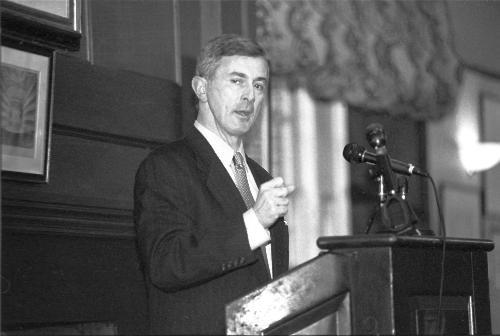
News
Summers Will Not Finish Semester of Teaching as Harvard Investigates Epstein Ties

News
Harvard College Students Report Favoring Divestment from Israel in HUA Survey

News
‘He Should Resign’: Harvard Undergrads Take Hard Line Against Summers Over Epstein Scandal

News
Harvard To Launch New Investigation Into Epstein’s Ties to Summers, Other University Affiliates

News
Harvard Students To Vote on Divestment From Israel in Inaugural HUA Election Survey
Cellucci Urges Foreign Trade

The United States must keep international trade a top priority even amid worries about border security following the Sept. 11 attacks, former Mass. Governor and current U.S. Ambassador to Canada A. Paul Cellucci said yesterday in a speech at the Faculty Club.
“In my opinion, the terrorists win if we have to close down factories because of border delays,” Cellucci said.
Cellucci said the U.S. and Canada must build a “zone of confidence” that encompasses both North American nations. Within the zone, the two countries would implement comparable security measures, share intelligence and coordinate their standards for screening immigrants.
The Sept. 11 terrorist attacks have drawn attention to security along the 5,500-mile border shared by the U.S. and Canada, Cellucci said. But he said the countries, which do $1.4 billion in business each day across the border, “must enhance security without damaging trade.”
To this end, Cellucci said both sides should create a so-called “smart” border that would use electronic technologies to scan and verify proof-of-citizenship documents and trucks’ cargo manifests. The high-tech border measures would allow passengers and cargo to cross the border securely and efficiently, he said.
To speed up customs procedures at the borders, he added, shipments of everyday industrial goods should be processed away from the border at the shipping yards where they originate.
An important part of the trade between the two countries, Cellucci said, is commerce in oil, natural gas and other energy sources. He highlighted work done during his days as Mass. Governor to alleviate a home heating oil crisis by opening a direct pipeline to the state from Nova Scotia’s Sable Island.
He also signaled his support for the Bush administration’s controversial energy plan, which aims to modernize energy-trading infrastructure and enhance the security of energy production.
The Bush plan has come under fire for being too friendly to power suppliers. And of late environmental concerns have been an “irritant” in U.S.-Canada diplomatic relations, Cellucci said.
Addressing accusations that the Bush plan is not concerned enough with environmental issues, Cellucci countered that 40 percent of the plan’s expenditures go toward conservation efforts.
He also denied reports that he discouraged Canadian officials from ratifying the Kyoto global warming treaty, which was rejected late last year by the Bush administration.
The United States’ rejection of the treaty “should not be read as an abdication of our [environmental] responsibilities,” Cellucci said.
Reporters covering his speech would not let Cellucci leave without pressing him to comment on the 2002 Mass. gubernatorial race and the chances of his successor, Acting Gov. Jane Swift.
“I’m a diplomat now, I’m not supposed to get involved in politics,” he said, “but I think I can say that Jane Swift is doing a great job and I’m proud of her.”
Want to keep up with breaking news? Subscribe to our email newsletter.
